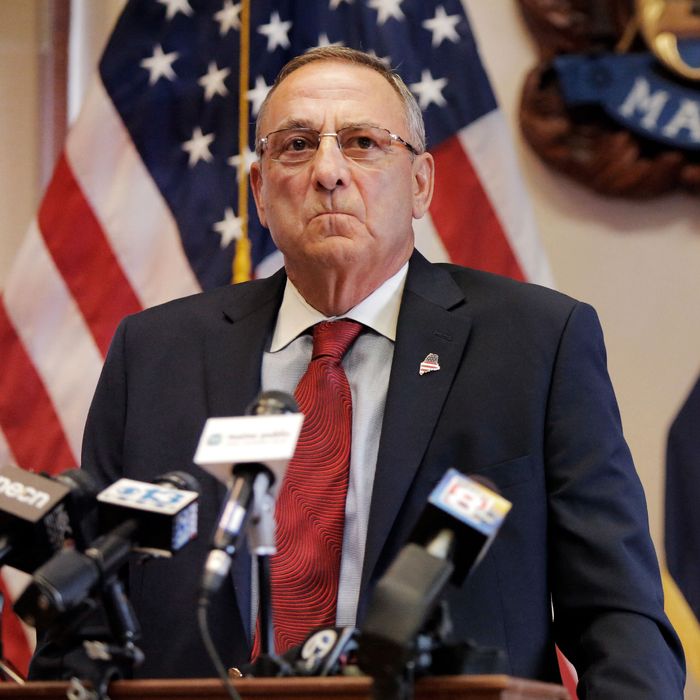Can Paul Lepage Run for Governor Again in Future
2022 midterms
Paul LePage Is Running for Governor of Maine Again

Paul LePage volition return to politics to challenge his nemesis, Janet Mills. Photo: Gregory Rec/Portland Press Herald via Getty
Donald Trump isn't the just demagogic, race-baiting septuagenarian Republican political leader threatening to return from a sunny Florida retreat to stem the earth in an upcoming ballot. Former Maine governor Paul LePage, who credibly boasts that he was Trump earlier Trump was Trump, joined snowbirds in decamping to Florida afterward his land's ban on more than two consecutive terms forced him to hand over the governor's office to Democrat Janet Mills, his nemesis as attorney general for half dozen of his viii years in function. At kickoff, he vowed he was giving upward politics for a repose retirement and maybe some teaching gig to scratch his crawling to lecture everyone in sight.
Simply now, at the age of 72, LePage is dorsum home and has announced he will claiming Mills in 2022. Leaders of his party seem resigned to resume their tutelage under this angry reactionary who is very far from the traditional image of balmy-mannered Maine Republicans. It's understandable: LePage defied expectations in both of his winning gubernatorial races in 2010 and 2014, almost winning a majority the second time around (though still needing, as he did in 2010, an independent candidacy to accomplish a plurality). And Trump, his Washington doppelgänger, did well enough in rural Maine to win a unmarried balloter vote in both 2016 and 2020 under the country's system of dividing electoral votes by congressional commune.
Mills won comfortably in 2018 (51 percent to 43 percent over would-be LePage protégé Shawn Moody), and her 57 percent job-approval rating in a local poll terminal month made her the most pop elected official in the state (aided past the fact that newly reelected Republican senator Susan Collins lost big chunks of GOP support by voting for Trump's conviction on impeachment charges in February). Maine's record in COVID-xix vaccinations nether Mills'due south direction has been solid, but her success in unraveling many of LePage's policies (especially his stubborn opposition to a Medicaid expansion, even later on Maine voters repudiated his position in a referendum) has been a red flag to her predecessor. In his announcement, LePage attacked Mills for accepting lavish funding under federal COVID stimulus plans, proverb, "We simply cannot continue to look to Washington, D.C., for bailouts, subsidies, or leadership." But equally Gabrielle Gurly noted in The American Prospect, that could be a tough sell: "How the Maine electorate responds to Republican anti-Washington messaging on wasteful government spending during the worst wellness crisis in American history will be an important indicator of the long-term immovability of Trumpism."
LePage may have two reasons to think he can make a comeback. Kickoff, similar all Republicans, he figures to become a flake of a midterm tailwind from a national tendency against the party controlling the White House, much as Mills probably did in 2018. And 2d, he may once again do good from divided opposition, as Gurley explains:
Former state Sen. Tom Saviello, a Republican from the central Maine boondocks of Wilton, is threatening an independent run to counter Mills'south and LePage's support for the New England Clean Energy Connect Corridor, a Central Maine Ability (CMP) project to build a transmission line through western Maine to funnel Quebec's hydroelectric ability to Massachusetts. Saviello calls it "a bad deal for Maine."
Maine Democrats accept tried to deal with the state'due south tendency to back up contained and small-scale-party candidates past instituting ranked-pick voting (which LePage and other Republicans, recognizing their own minority condition in the country, accept strongly opposed). But while RCV is in result for all federal contests and for state primaries in Maine, information technology does not (cheers to a provision in the state constitution) apply to state executive-co-operative or legislative general elections.
Inevitably the Mills vs. LePage grudge match will be watched nationally every bit a barometer non only of a potential backlash to the Biden administration just as a harbinger for a 2024 Trump comeback. Sure, Trump has a lot of protégés who will be on the election in 2022, from Kristi Noem to Ron DeSantis to whatsoever MAGA howler emerges from a Senate Republican mud-wrestling bout in Ohio. But none of them so resembles the 45th president in advised nastiness and mendacity as much every bit LePage does. If he can slither back into Blaine House (the governor'southward residence in Augusta) in 2023, who volition tell Trump he can't return to the White Business firm ii years later? Maine voters may desire to recall about that before heading to the polls next year.
Source: https://nymag.com/intelligencer/2021/07/paul-lepage-to-run-for-governor-again.html
0 Response to "Can Paul Lepage Run for Governor Again in Future"
Post a Comment